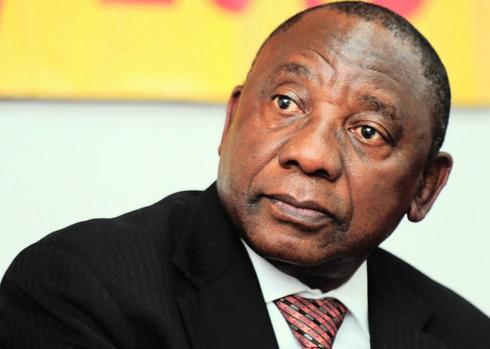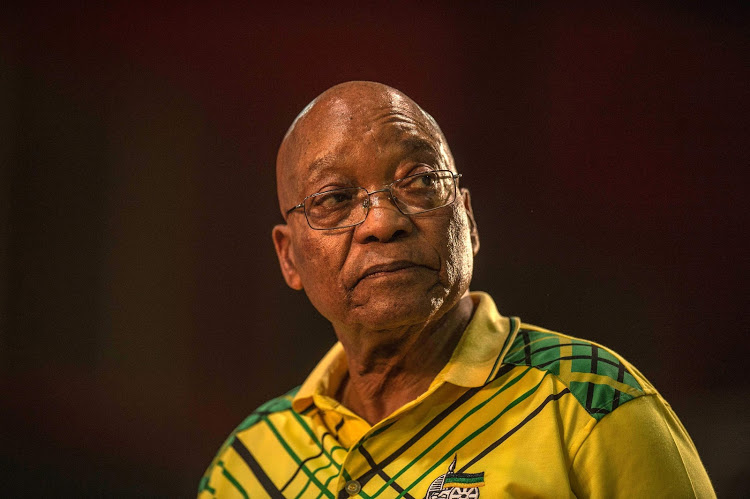By Peter Olorunnisomo – The South Africa nation and indeed, one of the most developed nations in Africa, has found itself a new president in the person of Cyril Ramaphosa. He was confirmed as the new President of South Africa on Thursday just hours after the scandal-plagued Jacob Zuma resigned from office.


Zuma agreed to step down after the ruling African National Congress (ANC) threatened to impeach him via parliament later today.
Ramaphosa, the leader of the ruling African National Congress party since December, was the only candidate nominated during a session of parliament.
The post of South African president rests with the party that has a parliamentary majority. The ANC recalled Zuma as its deployee to the post earlier this week but Zuma disagreed with the decision but opted to respect it in the interest of party unity.
Ramaphosa was elected unopposed as Zuma’s permanent successor by parliament, and declared duly elected by South African Chief Justice Mogoeng Mogoeng.
The announcement was met with cheers by some members of the National Assembly in Cape Town, though members of the opposition Economic Freedom Fighters party walked out of the chamber in protest during the debate.
“I truly feel humbled to have been given this great privilege of being able to serve our people,” Ramaphosa said in an address to members of parliament moments after he was confirmed as President.
He pledged to act as a “servant of our people” and said he intended to lead with “humility, faithfulness and dignity.”
“I will try to work very hard not to disappoint the people of South Africa,” Ramaphosa added.
Supporters of the new President sang and danced outside the National Assembly following his speech.
South Africa’s main stock market index jumped nearly 4 percent, putting it on track for its biggest one-day gain in more than two years as investors welcomed Zuma’s resignation after nine years in office plagued by corruption allegations.
The rand, which has gained ground whenever Zuma ran into political turbulence, soared to a near three-year high against the dollar on word of his resignation.
In his first speech to parliament as president, Ramaphosa called on politicians that ‘South Africa must come first in everything we do’.
The 75-year-old Zuma said in a 30-minute farewell address to the nation he disagreed with the way the ANC had thrust him towards an early exit after Ramaphosa replaced him as party president, but would accept its orders.
But the road back to prosperity and self-respect under Ramaphosa, who became ANC head in December, will be long and hard in a nation still polarised by race and inequality more than two decades after the end of white-minority rule.
Ramaphosa’s elevation caps a dramatic week that saw Zuma, dogged by corruption allegations for years, effectively pushed out of office by his own party. Zuma denies all of the corruption allegations against him.
Parliament had been due to hold a no-confidence vote on Thursday to remove Zuma from office.
In a nationally televised address on Wednesday night, Zuma announced his resignation, saying he had been disturbed about what he described as “instances of violence” outside the party’s headquarters.
“No life should be lost in my name and also the ANC should never be divided in my name. I have therefore come to the decision to resign as President of the Republic with immediate effect,” Zuma said.
“Even though I disagree with the decision of the leadership of my organization, I have always been a disciplined member of the ANC,” he added.
The 65-year-old Ramaphosa who, as deputy president, became interim president immediately after Zuma’s resignation on Wednesday — made his name as a trade union leader during the apartheid era and as the chief negotiator for Nelson Mandela, helping to shepherd the country out of white minority rule in the 1990s.
When Mandela’s presidency came to a close, he made it clear that he wanted Ramaphosa to succeed him. But Ramaphosa lost the race to lead the ANC and therefore the country to Thabo Mbeki, another anti-apartheid leader who returned to South Africa after living in exile.
Ramaphosa left government afterward and made his fortune in the business world.
However, since returning to public life he has spoken out against corruption in the country and has found significant support in urban areas, in the business community and among ANC stalwarts.
Ramaphosa was elected to head the ANC in December with a pledge to tackle corruption and the myriad of other problems facing the country.
“We want to clean up South Africa so that we can begin to make it more attractive to investors but at the same time to deal with the issues that are impeding growth,” Ramaphosa told CNN’s Christiane Amanpour in an interview last month.
Ramaphosa said he believed his anti-corruption campaign would reinvigorate supporters of the ANC who were previously disillusioned with the party.
“This is not a flash in the pan,” Ramaphosa said. “We are going to make sure that we do not disappoint our people.”
However, Zuma’s departure late on Wednesday provided evidence of the strength of South Africa’s democratic institutions, from the courts to the media and the constitution.
Ramaphosa’s first state of the nation address is expected to take place on Friday.
Kindly follow us on twitter:@AfricanVoice2








